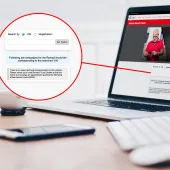EPC-UK enhance occupational road safety

Company drives home importance of employee enhanced driving capabilities through IAM course
COMMERCIAL explosives and blasting services specialists EPC-UK have reported the success of their Institute of Advanced Motorist (IAM) course – an initiative introduced to enhance ongoing commitment to the management of occupational road safety, whilst strengthening the company’s own zero harm policy and corporate social responsibilities.
Devised two years ago as part of a pilot partnership programme between EPC-UK and IAM, the advanced driving course was introduced following a request by EPC-UK’s managing director, Ben Williams, who proposed that all staff should have access to an effective defensive driver training programme covering all aspects of urban, suburban, A and B roads, dual carriageways and motorway driving.
With IAM ‘national observer’ status and experience of advanced driver training – achieved during his previous role as a military staff car driver – EPC-UK’s driver training manager, Tony Bird, was considered fully qualified to effectively conduct the two-day intensive programme of theoretical and practical instruction.
The course devised covers all required core competency criteria, including: legality and safety; introduction to ‘road craft’; core driving skills; advanced bends and cornering; eco-driving and vehicle sympathy; hazard management and effective planning; human factors and emotive influences (including stress); appropriate levels of progress and restraint (dependent on conditions); overtaking; and commentary driving (spoken thought).
Each intensive programme is run with a 2:1 student-to-instructor ratio, to ensure better engagement and to provide time for participants to demonstrate the core competencies required.
Teaching each student personally, Mr Bird has been able to deliver a tuition method that is both consistent and compliant with the standard needed to pass the advanced driving exam and achieve personal membership of the IAM.
‘Whilst most external training providers offer courses with a title of ‘defensive’ or ‘advanced’ training, such programmes often use only a diluted or condensed version of the original IAM programme, which often results in a ‘tick-box’ training exercise,’ he explained. ‘As a highly experienced driving instructor with full responsibilities for the IAM programme, I prefer to teach the full course to its maximum potential.’
With confidence in Mr Bird’s methods and results, managing director Ben Williams became the first EPC-UK advanced driving candidate. Having completed the training and passed the exam, he then began the process of rolling out the course to every company employee.
Phased according to location, Mr Bird has now delivered the course to company car and light commercial vehicle drivers across North Wales, The Midlands, South Wales, Somerset and south-east England.
An additional phase has also now commenced whereby fleet commercial drivers operating large goods vehicles are receiving the same standard of advanced training as the company’s car drivers, which means EPC-UK will become the only transport operator in the UK who can confirm that every one of their drivers fully qualifies as a member of the IAM.
A third-phase will soon be implemented whereby all remaining employees within EPC-UK, regardless of their company driver status, will benefit from completing the course.
‘Whilst not every employee drives a company vehicle, each is still part of the EPC-UK family, driving to and from work every day,’ said Mr Williams. ‘As a business, EPC-UK have also committed to continually supporting the annual costs of all employees’ IAM membership fees for life.’
In addition to being qualified advanced drivers, EPC-UK IAM members will benefit from reduced insurance premiums on their personal vehicles, a range of discounted offers on retail car sales and holidays, a magazine subscription, quarterly events and IAM-enhanced discounts for friends and family.
Course qualification will also reduce the likelihood of EPC-UK staff becoming involved in traffic incidents, lessen the occurrences of fleet maintenance repairs, and reduce fuel consumption through the application of eco-driving techniques.









